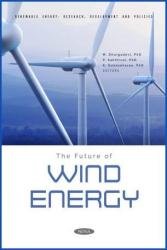The Future of Wind Energy
- Добавил: literator
- Дата: 31-03-2023, 13:59
- Комментариев: 0
 Название: The Future of Wind Energy
Название: The Future of Wind EnergyАвтор: K. Gunasekaran M. Dhurgadevi, P. Sakthivel
Издательство: Nova Science Publishers
Год: 2022
Страниц: 140
Язык: английский
Формат: pdf (true)
Размер: 46.7 MB
This book provides fundamental concepts of wind energy systems and discusses the design issues for the future as well as the challenges in wind energy research. The future of wind energy relies on Artificial Intelligence, Cloud Computing, IoT, Blockchain and Big Data analytics for wind energy generation and monitoring. Energy optimizations are also very much needed. Recently, electricity generation using wind power has received much attention all over the world. Wind energy is a free, renewable resource, so no matter how much it is used today there will still be the same supply in the future.
A wind turbine is a machine that converts the energy of the wind into other more useful forms, like mechanical energy. Water pumping wind turbines are generally referred to as wind turbines. Shrouded wind turbines are characterized by a higher mass flow rate of air passing through the turbine blades as compared to bare wind turbines. Thermoeconomic analysis of shrouded wind turbines considers different shroud area ratios and the speed range of the wind turbine. The significant intension of this work is to frame an Artificial Neural Network (ANN) with the assistance of optimization techniques. The ANN is utilized to predict the various thermoeconomic parameters of wind power generation based on wind speed and turbine surrounding area. Different optimization techniques such as Particle Swarm Optimization (PSO), Ant Colony Optimization (ACO), and Harmony Search (HS) algorithms are utilized to arrive at the optimal weight of the ANN process. All the optimum results demonstrate that the error values attained between the output of the experimental values and the predicted values are close to zero in the designed network.
Chapter 1 discusses with the economic integration of wind energy.
Chapter 2 provides risk analysis based selection of the best supply chain using the Gray approach for wind energy system.
Chapter 3 depicts a review of surface hardness improvement techniques for wind turbine gears.
Chapter 4 provides a comparison of Artificial Neural Network techniques in the prediction of wind speed using combinations of metrological variables.
Chapter 5 presents a Machine Learning approach for thermodynamic analysis in wind turbines with optimization.
Chapter 6 elicits the design, modelling and analysis of wind turbine gear and modified wind turbine blades.
Finally, this book covers hardware as well software analysis of the generation of wind energy and status of wind energy with modification of wind turbine also.
Скачать The Future of Wind Energy
[related-news] [/related-news]
Внимание
Уважаемый посетитель, Вы зашли на сайт как незарегистрированный пользователь.
Мы рекомендуем Вам зарегистрироваться либо войти на сайт под своим именем.
Уважаемый посетитель, Вы зашли на сайт как незарегистрированный пользователь.
Мы рекомендуем Вам зарегистрироваться либо войти на сайт под своим именем.
